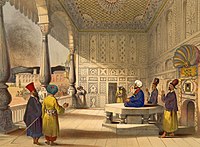
Back سياسات أفغانستان Arabic Əfqanıstanın dövlət quruluşu Azerbaijani Държавно устройство на Афганистан Bulgarian Politisches System der Islamischen Republik Afghanistan German Politiko de Afganio Esperanto Política de Afganistán Spanish سیاست جمهوری اسلامی افغانستان Persian Politique en Afghanistan French Politica dell'Afghanistan Italian 아프가니스탄의 정치 Korean
| History of Afghanistan |
|---|
 |
| Timeline |
The government of Afghanistan is currently disputed following the effective collapse of the Islamic Republic of Afghanistan during the fall of Kabul to Taliban forces on 15 August 2021 and the subsequent re-establishment of the Islamic Emirate of Afghanistan which now exercises de facto control over most of the country. On 7 September 2021 the Taliban officials in de facto control of most of Afghanistan announced a new interim government headed by Mullah Mohammad Hassan Akhund as Prime Minister.[1] The government is subject to the oversight of the Taliban's Supreme Leader, Haibatullah Akhundzada. As of 8 September 2021, the Islamic Emirate of Afghanistan has not yet been formally recognized as the de jure government of Afghanistan by any other country.[2] The representatives appointed by the Islamic Republic of Afghanistan continue to represent the country at the United Nations. These representatives have refused to recognize the Taliban appointed government and have urged other countries to not recognize this government either.[3]
Between 2002 and 2021, the government of Afghanistan consisted of the cabinet of ministers, provincial governors and the national assembly, with a president serving as the head of state, head of government and commander-in-chief of the Afghan Armed Forces. The nation was formerly led by President Ashraf Ghani who was backed by two vice presidents, Amrullah Saleh and Sarwar Danish until Ghani fled to the United Arab Emirates (UAE) in August 2021 due to Taliban fighters reaching the capital Kabul, which established a de facto government. In the last decade the politics of Afghanistan have been influenced by NATO countries, particularly the United States, in an effort to stabilise and democratise the country. In 2004, the nation's new constitution was adopted and an executive president was elected. The following year a general election to choose parliamentarians took place.
Hamid Karzai was declared the first-ever democratically elected head of state in Afghanistan in 2004, winning a second five-year term in 2009. The National Assembly was Afghanistan's national legislature. It was a bicameral body, composed of the House of the People and the House of Elders. The first legislature was elected in 2005 and the most recent one in 2018. Members of the Supreme Court were appointed by the president to form the judiciary. Together, this system served to provide a set of checks and balances.
- ^ "Hardliners get key posts in new Taliban government". September 7, 2021. Archived from the original on September 7, 2021. Retrieved September 7, 2021 – via www.bbc.com.
- ^ "Afghanistan: Taliban increasingly violent against protesters – UN - BBC News". Archived from the original on 2021-09-10. Retrieved 2021-09-10.
- ^ "Afghan envoy to UN: Don't recognise Taliban govt". Pajhwok Monitor. September 8, 2021. Archived from the original on September 8, 2021. Retrieved September 8, 2021 – via pajhwok.com.
© MMXXIII Rich X Search. We shall prevail. All rights reserved. Rich X Search